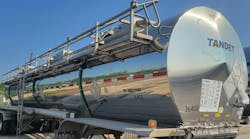Heating oil and vehicle fuels could become more expensive and more difficult to obtain in Washington DC if the DC Council goes through with a plan to ban new diesel-powered vehicles in the city, according to Dan Furth, president of National Tank Truck Carriers.
“This type of action demonstrates once again why the DC city council here in the nation’s capital garners so little respect,” Furth says. “As a tremendous example, consider for one minute just how difficult and costly it would be to deliver fuel to the many Washington DC gas stations with such a silly provision banning tractors that use the primary fuel of transportation today. It’s already difficult for the country’s trucking industry to keep up with rising tractor costs related to ever-increasing regulatory requirements. The good news for District residents is that Maryland and Virginia service stations will be happy to sell them fuel.”
As a part of the American Trucking Associations, NTTC is among a coalition of trucking industry groups that have warned the DC Council that provisions in the recently introduced Sustainable DC Omnibus Act of 2013 would have “significantly harmful effects on the District’s economy and on the quality of life of District residents.”
The provision would ban registrations of new diesel-powered vehicles: commercial trucks, buses, automobiles and fire trucks after 2017. This ban, because of interstate registration compacts would effectively outlaw any new diesel-powered vehicles from crossing the District line.
The result would be that no new diesel vehicles, after January 1, 2018 would be allowed to enter Washington DC, even if they were just passing through on one of the busiest interstates in the nation and not stopping to do business. Interestingly, older diesel vehicles would still be allowed to operate in DC.
“We’re very concerned that this provision, which is unnecessary to achieve the goals of the overall bill, would have a number of adverse effects on the residents and businesses in our nation’s capital,” says Bob Pitcher, vice-president of state laws for American Trucking Associations. “If enacted as written, there will be serious disruptions to the supply chain for DC, which receives the vast majority of its goods via truck.”
In a letter to the Council, ATA along with the American Moving and Storage Association, Truck Renting and Leasing Association, Maryland Motor Truck Association and Virginia Trucking Association, warned that there several possible outcomes of the proposal, all of them negative.
“Most likely, the District will find itself not benefitting from advances in safety and emissions technology more found on newer trucks, meaning progressively older and older vehicles will be delivering to the city,” Pitcher says. “Shippers may also choose to receive smaller, more frequent deliveries in smaller gasoline-powered vehicles … many, many gasoline-powered vehicles to add to one of the nation’s already most congested cities.
“However, it may be as time goes on that carriers may simply choose not to send trucks into the District at all. While inconvenient for District residents, the ban on diesel trucks will certainly be a boon for the economies of Maryland and Virginia who stand to benefit from DC residents looking elsewhere for essential goods.”
In 2012, trucks moved 68.5% of all US freight by weight, and delivered 100% of all consumer goods in the country. More than 80% of communities rely solely on trucks for their freight needs.
“We encourage the DC Council to drop this provision in order to safeguard the economy and quality of life of their city,” Pitcher says.








